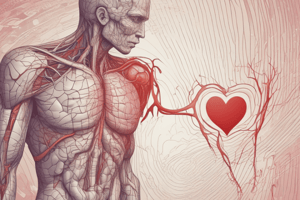Podcast
Questions and Answers
Which of the following is a common cause of CVA (stroke)?
Which of the following is a common cause of CVA (stroke)?
- Hypertension
- Embolism
- Thrombosis
- Atherosclerosis (correct)
What is the main consequence of total occlusion of a cerebral blood vessel?
What is the main consequence of total occlusion of a cerebral blood vessel?
- Ischemia
- Necrosis (correct)
- Hemorrhage
- Inflammation
How long does it take for irreversible nerve cell damage to occur due to ischemia?
How long does it take for irreversible nerve cell damage to occur due to ischemia?
- 3 minutes
- 5 minutes (correct)
- 1 minute
- 2 minutes
Which type of stroke is caused by a sudden obstruction in a cerebral artery?
Which type of stroke is caused by a sudden obstruction in a cerebral artery?
What is the third class of stroke?
What is the third class of stroke?
Which type of stroke affects large portions of the brain?
Which type of stroke affects large portions of the brain?
What is the consequence of a ruptured cerebral vessel?
What is the consequence of a ruptured cerebral vessel?
Which area of the brain is immediately lost when a stroke occurs?
Which area of the brain is immediately lost when a stroke occurs?
What causes gradual narrowing of the arterial lumen in atherosclerosis?
What causes gradual narrowing of the arterial lumen in atherosclerosis?
What is the consequence of tissue liquefaction in the brain after a stroke?
What is the consequence of tissue liquefaction in the brain after a stroke?
Which of the following is a secondary effect of bleeding in the brain?
Which of the following is a secondary effect of bleeding in the brain?
What can an MRI determine in relation to a stroke?
What can an MRI determine in relation to a stroke?
What tends to increase the neurologic deficits in the first 48 to 72 hours after a stroke?
What tends to increase the neurologic deficits in the first 48 to 72 hours after a stroke?
What must be minimized as quickly as possible in the brain after a stroke?
What must be minimized as quickly as possible in the brain after a stroke?
What remains in the brain after a stroke, resulting in a permanent loss of neurons?
What remains in the brain after a stroke, resulting in a permanent loss of neurons?
What is a possible outcome for a person who has experienced a stroke with intensive therapy?
What is a possible outcome for a person who has experienced a stroke with intensive therapy?
What are common complications after a stroke?
What are common complications after a stroke?
What can lead to significant secondary damage in the brain after a hemorrhage?
What can lead to significant secondary damage in the brain after a hemorrhage?
What can an MRI illustrate in relation to the dysfunction caused by a stroke?
What can an MRI illustrate in relation to the dysfunction caused by a stroke?
What is the purpose of collateral circulation in the brain?
What is the purpose of collateral circulation in the brain?
Flashcards are hidden until you start studying




